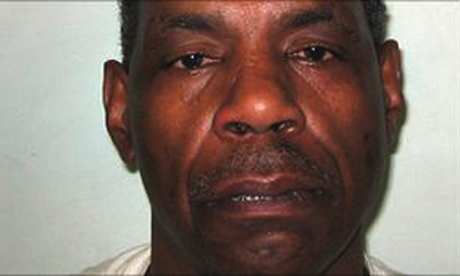Murderer of mother and two young girls 28 years ago is jailed for life

Tony Dyce, who was tracked down thanks to the efforts a journalist researching a biography of the footballer Laurie Cunningham
A sexual predator who committed a triple murder that went undetected for 28 years was today sentenced to spend the rest of his life in prison.
Tony Dyce believed he had escaped suspicion after killing Norma Richards, 27, and two of her young daughters at their home in Dalston, north-east London in July 1982.
The 54-year-old was eventually tracked down thanks to the efforts of Peter Law, a journalist who was researching a biography of the footballer Laurie Cunningham. The late England player’s brother was Richards’ partner.
The writer’s inquiries triggered a cold case police review that led officers to re-examine stored forensic evidence and reopen the unsolved case. Dyce was arrested last October.
Keith Cunningham lived with Richards and her three daughters, who were from a previous relationship.
The youngest daughter, Rhodene, who was four at the time of the murders, survived because she had been staying with her grandmother that weekend.
During the trial, it emerged that Dyce, of Forest Gate, east London, had been a sexual predator who habitually carried a knife. Other women told the court he had attempted to rape them at knifepoint.
Dyce had not been suspected because he had been only a minor acquaintance of Cunningham and Richards. Early that morning, he had followed her home from a club knowing that her partner was away in Spain with his brother, who was playing for Real Madrid.
Dyce raped her and stabbed her to death. One or other of the young girls – Samantha, nine and Syretta, seven – is thought to have been woken by the noise. They were drowned and stabbed to prevent them from identifying the intruder.
It was only through advances in DNA that Dyce was eventually detained. Aftab Jafferjee QC, prosecuting, said Richards was raped and stabbed five times.
The girls were found in a bath filled with water. Samantha had been stabbed eight times and Syretta was drowned. “Their crime was to have seen their mother’s attacker, and so their young lives had to be violently snuffed out,” Jafferjee said.
Dyce tried to cover his tracks by daubing the National Front NF sign on walls and doors. “The diversion was doomed to failure, and not even the original 1982 investigations fell for that,” the prosecutor added. Detectives had made arrests and interviewed suspects, but no one else had ever been charged with the killings.
Sentencing Dyce at the Old Bailey, Judge Anthony Morris handed down three life sentences and told him it would constitute a whole life term. “These were offences of unspeakable brutality and utmost gravity,” he said.
“You got away with these offences for 28 years and, since your arrest last year, you have shown no remorse whatsoever. I am satisfied the seriousness of these offences is exceptionally high and you should never be released.”
Laurie Cunningham, who made his name playing for West Bromwich Albion, died aged 33 in a car crash in Spain in 1989. He was the first black player in the England squad.
Rhodene Cunningham, now 32, is still haunted by the memories of what she and her grandmother discovered when they went returned to the family home.
“When I was four, I found my mum and my sisters dead in our flat,” she told the judge in a victim impact statement. “I was really scared. My mum was just lying there covered in blood. I ran upstairs and my sisters were in the bath. They were dead too.
“After the funeral, I went to live with my dad’s parents. I had a good upbringing, I enjoyed school, had a lot of friends, but at the back of my mind, my mum and sisters were dead.
“It was weird going from being the youngest to the eldest, not being able to talk to my sisters about boys, make-up and secrets. I can remember taking their things and running off with them, having fun and laughing with them.
“What could it have been like growing up with them? I’ll never know – I never got the chance.
“As I got older, it got harder. I knew they weren’t coming back. Every year on my birthday I would cry – it would be tears of happiness as I remembered them all, but also of great sadness.
“As for my other family members, no one would talk about my mum. I guess it was too much for them.”
guardian.co.uk © Guardian News & Media Limited 2010
Published via the Guardian News Feed plugin for WordPress.
